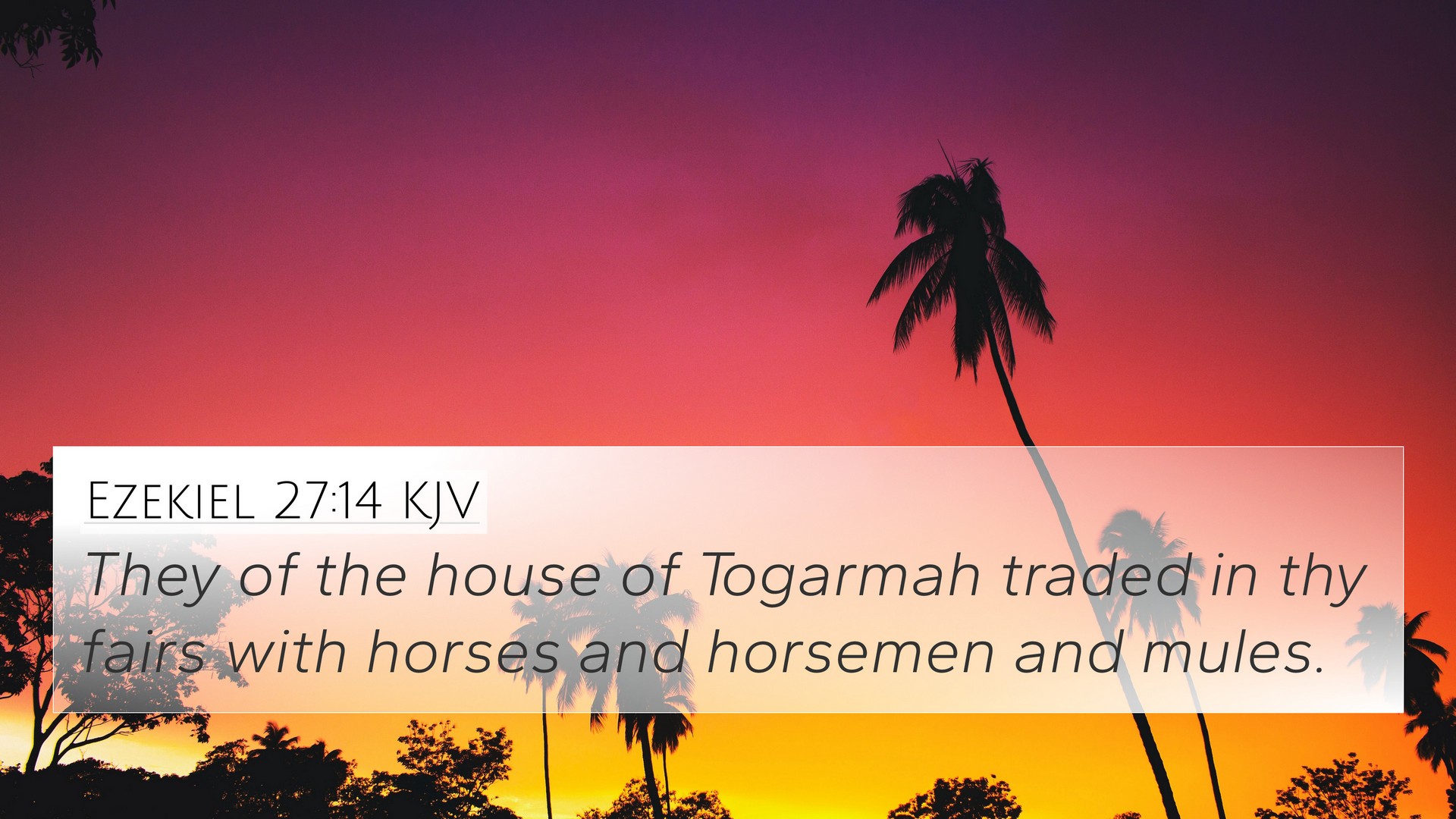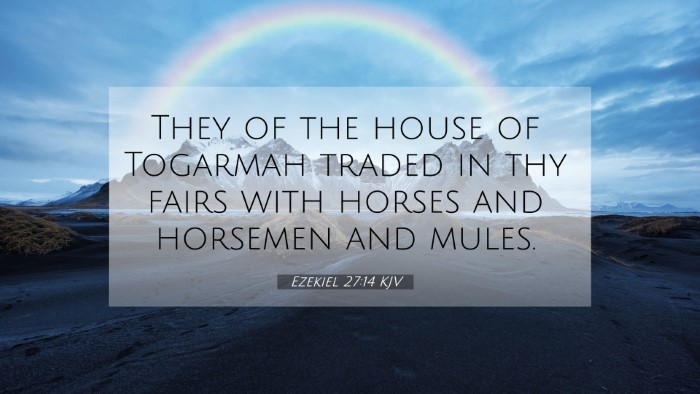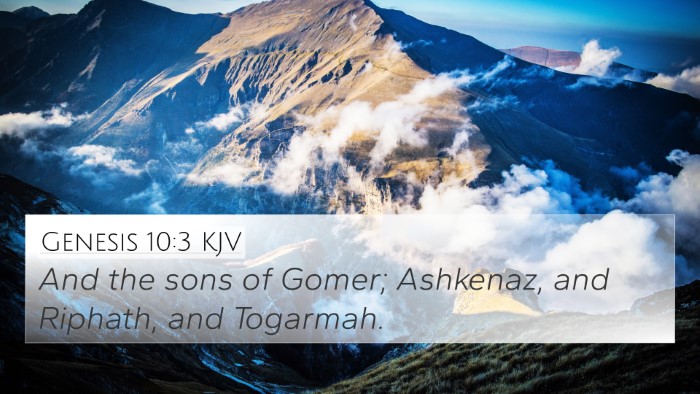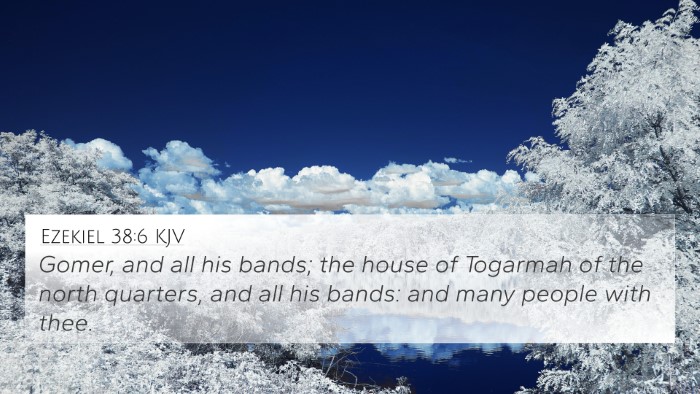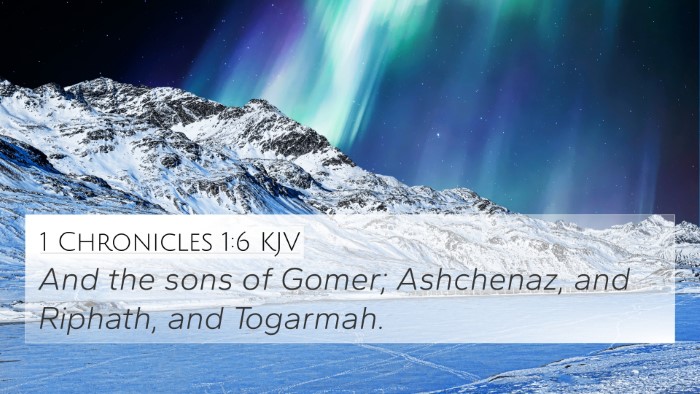Ezekiel 27:14 - Summary and Interpretation
Ezekiel 27:14 reads: "They of the house of Togarmah traded in thy fairs with horses and horsemen and mules." This verse reflects on the economic and trade relationships established in ancient times, particularly emphasizing the notable traders from Togarmah. In this analysis, various public domain commentaries will be synthesized to enhance understanding of the verse's meaning and implications.
Contextual Understanding
Ezekiel was a prophet during the Babylonian exile, and much of his work revolves around judgment, restoration, and the nations' roles concerning Israel. The specific reference to Togarmah indicates trade networks that extended beyond Israel, encapsulating the economic dynamics of the ancient Near East.
Key Interpretive Insights
-
Matthew Henry:
Henry notes the significance of God’s judgment against Tyre, the principal trading power. He emphasizes the trade routes that connected various nations, illustrating God's sovereignty over economic affairs and their ultimate destruction as a divine action against pride and excess.
-
Albert Barnes:
Barnes highlights that the mention of Togarmah serves to show the extensive trading capacity Tyre had, including alliances with neighboring regions. This connection demonstrates not only commerce but also regional relationships that played a role in biblical history.
-
Adam Clarke:
Clarke interprets Togarmah as a representative for the nations that provided valuable goods and services. His discourse points toward the mysterious yet beneficial relationships among nations, pointing out how they reflect a broader scriptural narrative regarding interactions between peoples.
Cross-Referencing Biblical Texts
Exploring the theme of trade and relations, Ezekiel 27:14 can be cross-referenced with various other scriptures to ascertain a deeper understanding:
- Genesis 10:3: Mentions Togarmah as a descendant of Japheth, linking commercial relations back to genealogical roots.
- 1 Kings 10:28-29: Discusses Solomon’s trade in horses from Egypt, showing the economic exchanges present during Israel’s prosperity.
- Isaiah 66:20: References the bringing of offerings from all nations, echoing the global trade and religious connections.
- Ezekiel 27:6-8: Details the craftsmanship and types of goods produced by traders symbolizing the wealth that corrupted Tyre.
- Revelation 18:11-17: Provides a prophetic vision of the fall of Babylon, likening it to Tyre's eventual destruction, reinforcing the theme of judgment against mercantile excess.
- Jeremiah 46:9: Whereas the conflict between nations is also explored, highlighting key trade goods like horses and chariots.
- Amos 1:9: Discusses the judgment fate awaiting Damascene, attaching commercial implications to prophetic judgment.
Thematic Connections
The thematic undercurrent of Ezekiel 27:14 reveals the complexity of ancient international trade, often mirrored in the spiritual narrative of relationships between nations and God’s chosen people. The trade of horses, horsemen, and mules represents power, strength, and mobility, which can be seen as emblems of ambition and human endeavor.
Applications for Study
This verse serves as an excellent starting point for those delving into:
- How to find cross-references in the Bible by utilizing a Bible concordance.
- Understanding linking Bible scriptures through thematic connections present in the commerce of nations.
- Employing cross-reference Bible study techniques to enrich personal devotional life.
- Using Bible cross-reference guides during sermon preparation to bolster preaching with inter-Biblical dialogue on trade and excess.
Conclusion
Ezekiel 27:14 reveals much more than a mere historical account of trade; it provides insight into the interconnectivity of nations and the broader narrative of divine judgment. Through detailed examination using comparative Bible verse analysis, we uncover not only the societal implications of this verse but also its spiritual significance. As we cross-reference this text with others, we are encouraged to reflect upon the themes of wealth, power, and Divine oversight within our biblical pursuits.
